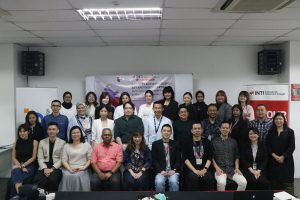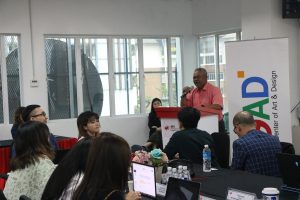At the recent Industry Advisory Board (IAB) session for Arts & Design, hosted by INTI International College Subang on 18 October 2024, industry leaders and educators gathered to discuss the growing impact of Artificial Intelligence (AI) on creative fields. As AI becomes an integral tool in design and multimedia, the conversation focused on using AI responsibly while maintaining the human essence that defines the arts.

Industry leaders and academicians from INTI’s Industry Advisory Board in Arts & Design gather for a collaborative session on the future of AI in creative industries.
A recurring theme throughout the session was the importance of ethical guidelines when integrating AI into creative work. Fish Ong Yu Xin, Art Director at Accenture Song, highlighted the need for empathy and human judgment in decision-making processes involving AI. “Strong levels of compassion, empathy, and moral guardrails are needed when making decisions with AI,” she stated, emphasising that while AI offers powerful capabilities, the human element remains irreplaceable.
This sentiment was echoed by discussions on the importance of teaching Arts & Design students how to use AI and when its use is appropriate. Participants agreed that it is crucial to establish clear policies to guide AI usage, especially to prevent unintentional plagiarism in the world of multimedia, where generative AI is becoming more prevalent. The need for ethical guidelines will help students navigate the evolving AI landscape.
Burhanuddin Md Radzi, Managing Director of Les’ Copaque, the studio behind the Oscar-nominated Malaysian animated series Upin & Ipin, reinforced these points by sharing how AI has transformed his company’s production processes. He noted that AI has enabled Les’ Copaque to maintain efficiency while producing world-class animated content, streamlining workflows without compromising creativity.

Burhanuddin Md Radzi, Managing Director of Les’ Copaque, shares insights on how AI has transformed production processes at the studio behind the Oscar-nominated Upin & Ipin.
The session also explored the idea that AI should be seen as a tool to support, rather than replace, human creativity. Industry leaders emphasized that while AI can enhance the work of designers, it cannot take over the artist’s role in the ideation process. AI’s strength lies in assisting rather than replacing creative professionals.
In addition to its creative support, AI’s potential for improving business sustainability was highlighted. Lim Chew Shien, Head Buyer at ZALIA & ZALIA Basics, Zalora, explained how AI has revolutionised retail by improving processes and reducing waste. “With the proper tools and AI analytics, sustainability follows. AI improves processes by creating less waste,” she shared, adding that AI’s ability to monitor trends and customer demand has led to more efficient production cycles, reducing excess inventory in the fashion industry.
The session highlighted the importance of preparing future designers with both the technical skills and ethical understanding needed to navigate AI’s expanding role in creative fields. Industry leaders stressed that AI should be a tool to enhance, rather than replace, human creativity, ensuring that as technology evolves, the core values of empathy, originality, and artistic expression remain central to creative work.

A dynamic exchange between industry experts and Arts & Design lecturers on the ethical integration of AI in creative work.